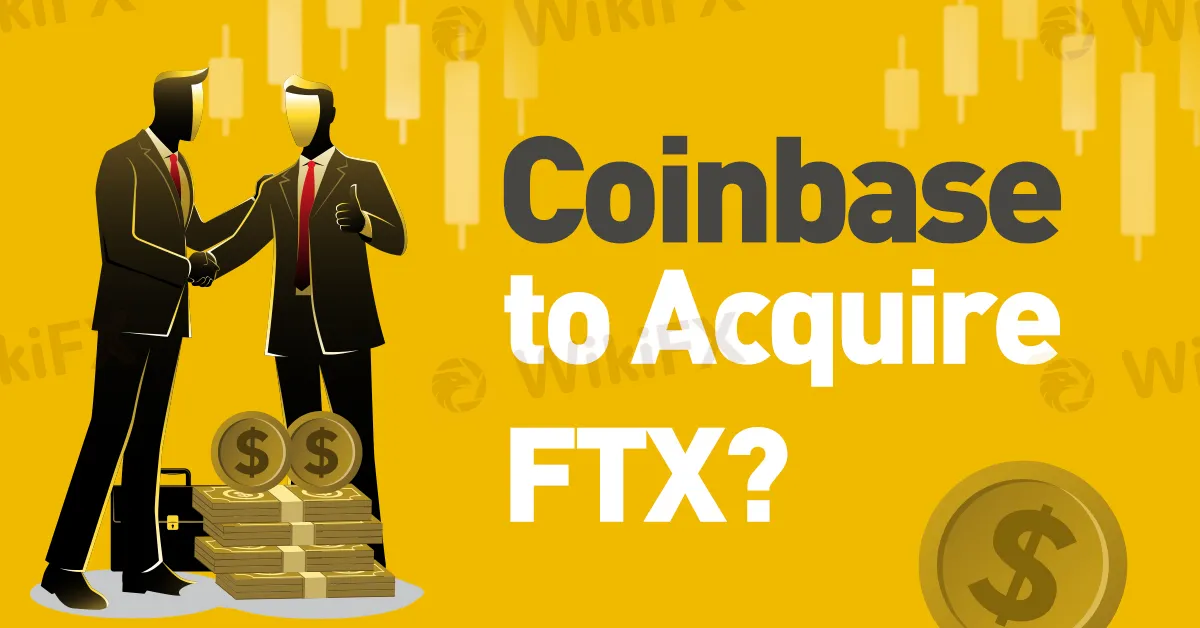简体中文
繁體中文
English
Pусский
日本語
ภาษาไทย
Tiếng Việt
Bahasa Indonesia
Español
हिन्दी
Filippiiniläinen
Français
Deutsch
Português
Türkçe
한국어
العربية
Coinbase to Acquire FTX??
Abstract:Coinbase is reportedly on the brink of acquiring FTX Europe in a strategic move to expand its presence in regions with well-defined cryptocurrency regulations, as the potential acquisition unfolds against the backdrop of FTX's parent company's bankruptcy and amidst a shifting crypto market landscape.

Coinbase is reportedly in the final stages of negotiations to acquire FTX Europe, signifying its intention to expand its presence in regions with clearly defined cryptocurrency regulations.
The backdrop for this potential acquisition is the bankruptcy of FTX's parent company in the United States in 2022. Negotiations have progressed to their concluding phases and were revived in early September.
A U.S. bankruptcy court has authorized FTX's liquidators to initiate bidding for four operational subsidiaries, including its Japanese and European branches. These subsidiaries encompass custody platform and broker-dealer Embed, crypto derivatives exchange and clearing house LedgerX, FTX Japan, and FTX Europe. Notably, these entities have garnered substantial interest, with approximately 117 expressions.
While the bankruptcy proceedings could be protracted, a committee representing FTX's creditors has prioritized the sale of these particular entities. Their rationale is that these businesses maintain strong financial positions, operate with independent management structures, and possess valuable market positions. However, there is a concern that their value may diminish if not promptly sold.

Coinbase's interest in acquiring FTX Europe is primarily driven by its derivatives business's profitability and expanding customer base. This move is significant, especially given the decline in spot trading volumes during the bear market. Recent data indicates that trading volumes for crypto financial instruments tied to popular cryptocurrencies like Bitcoin and Ethereum have exceeded spot trade volumes by a factor of six.
Interestingly, this development follows Coinbase's recent regulatory approval to introduce federally regulated cryptocurrency futures trading for eligible U.S. customers. With the launch of these new futures offerings, the largest crypto platform in the United States aims to further enhance its institutional services and broaden investment options for its client base.
The regulatory approval is pivotal as it now allows Coinbase to provide U.S.-based investors access to the cryptocurrency derivatives market, which was previously inaccessible to them. Crypto derivatives constitute over 75% of global crypto trades. However, due to their intricate nature and elevated risk levels, American investors were primarily excluded from participating in this segment, enabling traders to speculate on price movements without owning the underlying assets, such as cryptocurrencies like Bitcoin.
Additionally, Coinbase has reaffirmed its commitment to expanding its footprint in regions characterized by well-established cryptocurrency regulations, particularly in Europe. The company's recent blog post emphasizes that while many parts of the world are making significant strides in crypto-friendly laws, the U.S. seems to focus on enforcing existing rules and introducing new regulatory measures through legal processes.

Disclaimer:
The views in this article only represent the author's personal views, and do not constitute investment advice on this platform. This platform does not guarantee the accuracy, completeness and timeliness of the information in the article, and will not be liable for any loss caused by the use of or reliance on the information in the article.
Read more

Bybit Shuts Down NFT Marketplace Amid Crypto Market Downturn
Bybit announces the closure of its NFT marketplace, citing efforts to streamline offerings. Discover the latest trends in the declining NFT market and its shift to utility-based growth.

Galaxy Digital Settles $200M in Luna Token Manipulation Case
Galaxy Digital pays $200M to settle Luna token manipulation probe by NY regulators, linked to TerraUSD’s 2022 crash, impacting crypto market stability.

Vanuatu Passes VASP Act to Regulate Crypto and Digital Assets
Vanuatu's new VASP Act regulates crypto businesses, enforcing strict licensing, AML/CFT compliance, and investor protections.

Blockchain Decentralization: Empowering a Trustless Future
In recent years, blockchain technology has rapidly evolved from a niche innovation behind Bitcoin into a transformative force across industries. At its core, blockchain decentralization refers to the distribution of authority and decision-making away from a central entity and into the hands of a distributed network of participants. This shift redefines how data is stored and verified and paves the way for trustless, transparent, and resilient systems that challenge traditional centralized models.
WikiFX Broker
Latest News
The Withdrawal Trap: How Scam Brokers Lure Victims into Paying More
FCA to Investors: Think Twice Before Trusting These Brokers
Trump\s tariffs: How could they affect the UK and your money
Trump gambles it all on global tariffs he\s wanted for decades
TradingView Brings Live Market Charts to Telegram Users with New Mini App
Trump tariffs: How will India navigate a world on the brink of a trade war?
Interactive Brokers Launches Forecast Contracts in Canada for Market Predictions
Authorities Alert: MAS Impersonation Scam Hits Singapore
Stocks fall again as Trump tariff jitters continue
IG Group Acquires Freetrade for £160M to Expand UK Investment Market
Currency Calculator







